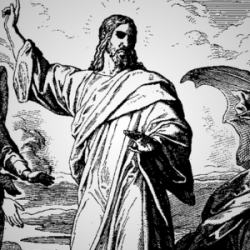Mormons don't have a systematically worked out theology of the fall. But we do have a coherent narrative of it, a narrative that we construct out of the Book of Mormon and other Latter-day scripture.
An oft-repeated Book of Mormon scripture suggests that the fall was a good thing, and that belief is central to the standard Mormon understanding: "Adam fell that men might be; and men are, that they might have joy" (2 Nephi 2:25). Adam's fall was a felix culpa, a fortunate fall.
But in another canonical book revealed to Joseph Smith, the book of Moses, the prophet Enoch says, "Because that Adam fell, we are; and by his fall came death; and we are made partakers of misery and woe" (Moses 6:48), which sounds more like the usual Christian understanding of things.
In a similar vein, a Book of Mormon prophet says we fell because of Adam and are in a carnal state because of the fall. Since we are fallen, he continues, we cannot merit anything of ourselves, but only through the suffering, death, and resurrection of Jesus Christ (Alma 22:12, 14). But for the atonement, we are "lost forever" (Alma 42:6).
Note that it is against this background that readers of the Book of Mormon ought to understand the earlier, much argued-over verse that says "it is by grace that we are saved after all we can do" (2 Nephi 25:23). Whatever "after all we can do" means, if we understand it as coherent with the teaching that we cannot merit anything of ourselves, then it cannot mean that first we do everything we can, after which Jesus makes up whatever we still lack.
Because of Adam and Eve's transgression, they and their descendants have been cut off from presence of the Lord (2 Nephi 9:6). We are cut off from him "both temporally and spiritually" (Alma 42:7). But we have been given a probationary time in which to repent and serve God (Alma 42:4). The question of our mortal probation is whether we will do those two things.
But what happened at the event of the fall? Most Mormons believe that Eve first and then Adam made a conscious choice to enter into mortality. Faced with the inability to have children in the Garden (Moses 5:11), Eve chose to be "the mother of all living" (Genesis 3:20; Moses 4:26). Then Adam equally consciously chose to leave the Garden with her rather than remain behind alone.
In taking of the fruit of the tree of knowledge of good and evil, Adam and Eve "became subject to the will of the devil . . . . [They] became spiritually dead" (D&C 29:40-41). But this death was appointed by God "that by [Adam and Eve's] natural death [they] might be raised in immortality into eternal life" (D&C 29:43). Because of Adam and Eve's transgression, they could have joy, living again with God in the flesh (Moses 5:10).
They had previously lived with God, but prior to their entry into the Garden, they had not been embodied. All things, including all persons, had been created spiritually, but not yet physically (Moses 3:5).
But according to Mormon belief, bodies are essential to eternal life. To be a soul is to be both a spirit and a body (D&C 88:15). Prior to our physical birth we were as yet incomplete as persons. Our creation was not yet finished.
Life on this earth is the completion of our creation, so the plan provided by the Father was a plan by which his spirit children could (among other things) enter into mortality and gain bodies to continue on the road to fullness of life (which comes, ultimately, only with God).





